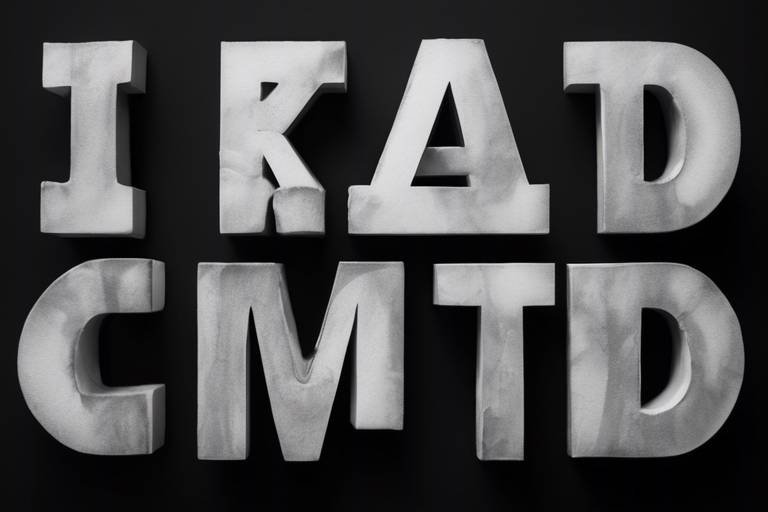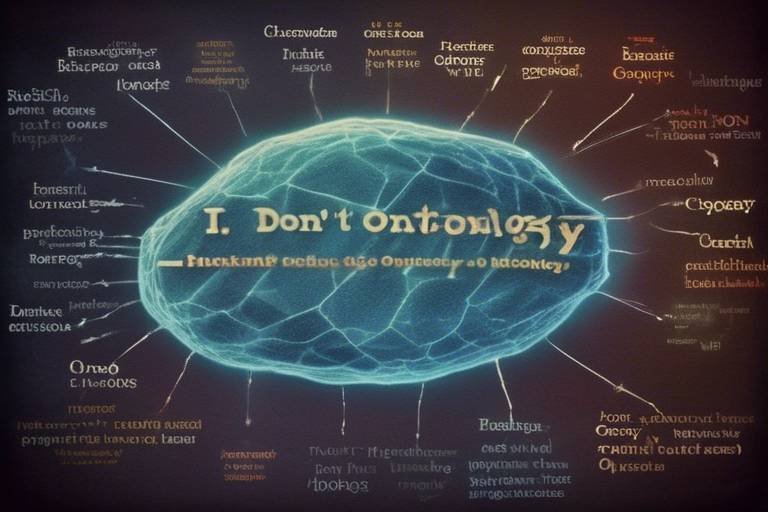Unveiling the Practical Significance of Ontology
Ontology might sound like a heavy philosophical term, but its significance stretches far beyond the realm of academia. In today's fast-paced world, where information overload is the norm, understanding how we categorize and represent knowledge is crucial. Think of ontology as a sophisticated map that helps us navigate the vast landscape of information. Just as a map provides clarity and direction, ontology offers a structured way to understand and organize the myriad concepts and relationships in various fields.
As we dive deeper into the practical implications of ontology, it becomes evident that its applications are not just theoretical but are actively shaping industries like artificial intelligence, healthcare, and even the semantic web. Imagine trying to communicate with someone in a different language without a shared understanding of concepts; that’s the confusion we face without proper ontological frameworks. Ontologies act as a bridge, enabling better communication and understanding across different domains.
Moreover, the benefits of ontology extend beyond mere organization. They enhance interoperability, allowing different systems to work together seamlessly. This means that data from one source can be understood and utilized by another, creating a more cohesive and integrated approach to information management. In a world where collaboration is key, ontologies are the unsung heroes that facilitate this synergy.
As we explore the various applications and advantages of ontology, we'll uncover how it not only streamlines processes but also fosters innovation. The future of ontology is bright, with emerging trends promising to further its relevance in an ever-evolving technological landscape. So, buckle up as we embark on this journey to unveil the practical significance of ontology!
- What is ontology? Ontology is the study of concepts and categories in a specific domain, focusing on how they relate to each other.
- How is ontology used in artificial intelligence? In AI, ontologies help in knowledge representation, enabling machines to understand and reason about data more effectively.
- Why is ontology important in healthcare? Ontologies standardize medical terminologies, improving data interoperability and enhancing patient care.
- What are the challenges in developing ontologies? Common challenges include complexity, evolving knowledge domains, and maintaining consistency over time.
- What is the future of ontology? As technology evolves, ontology will continue to play a critical role in data organization, semantic web technologies, and AI advancements.

Understanding Ontology
Ontology, at its core, is a fascinating branch of philosophy that delves into the study of concepts and categories. Imagine it as the blueprint for understanding how we categorize and relate different pieces of knowledge. In simpler terms, ontology helps us answer the fundamental question: What exists? It provides a structured framework to define the relationships between various entities, thus enabling us to better understand the world around us.
In the realm of knowledge representation and information systems, ontology plays a pivotal role. It acts as a bridge between human understanding and machine interpretation. By establishing a common vocabulary and set of rules, ontologies facilitate clearer communication, not just among humans but also between humans and machines. This is particularly important in our increasingly data-driven world, where the ability to retrieve and interpret information accurately can make all the difference.
To put it in perspective, think of ontology as the grammar of knowledge. Just as grammar allows us to construct meaningful sentences, ontology enables us to construct meaningful representations of knowledge. It provides the structure that allows various information systems to understand and process data effectively. For instance, in a library, ontology helps categorize books not just by title or author but also by genre, subject matter, and even the relationships between different works. This layered approach enhances the retrieval process, making it easier for users to find exactly what they are looking for.
The significance of ontology extends beyond mere categorization. It is instrumental in enhancing interoperability among different systems. In a world where data comes from countless sources and formats, having a common ontology allows disparate systems to communicate and share information seamlessly. This is especially crucial in fields like artificial intelligence and healthcare, where accurate data interpretation can lead to groundbreaking discoveries and innovations.
In summary, ontology is more than just an academic concept; it is a practical tool that enhances our ability to organize, share, and retrieve knowledge. By establishing a clear framework for understanding relationships among concepts, ontology not only enriches our comprehension of the world but also empowers technology to serve us better. As we continue to explore the vast landscape of knowledge representation, the role of ontology will only become more significant, paving the way for advancements in various fields.

Applications of Ontology
Ontology is not just a theoretical concept confined to the dusty shelves of philosophy; it is a powerful tool that has found its way into various practical applications across multiple domains. Imagine ontology as a sophisticated blueprint that organizes knowledge in a way that machines and humans can both understand. This structured representation of knowledge has pivotal applications in fields such as artificial intelligence, biomedical research, and semantic web technologies. Each of these domains leverages ontology to enhance their processes, improve data interoperability, and facilitate better decision-making.
In the realm of artificial intelligence, ontologies serve as a foundation for knowledge representation, enabling machines to reason about information effectively. For instance, consider a virtual assistant that needs to understand user queries. By employing an ontology that defines relationships between various concepts—like 'weather', 'forecast', and 'temperature'—the assistant can provide more accurate responses. This semantic understanding elevates user experience and allows for more intuitive interactions.
Moving into biomedical research, ontologies play a crucial role in standardizing terminologies and ensuring that researchers are on the same page. The Gene Ontology (GO), for example, is a widely used framework that categorizes gene functions across different species. This consistency in terminology allows researchers to share data more efficiently and collaborate across various studies, leading to accelerated discoveries in areas like genomics and drug development.
Moreover, the semantic web relies heavily on ontological structures to make data more accessible and meaningful. By using ontologies, web content can be tagged with rich metadata that describes the relationships between different pieces of information. This enhances search engine capabilities, allowing users to find relevant data faster and more accurately. For example, when searching for ‘Italian restaurants’, a semantic web application can utilize ontologies to present not just a list of names but also relevant details such as ratings, location, and even user reviews—all linked together in a meaningful way.
To illustrate the versatility of ontology, here is a table showcasing a few key applications across different fields:
| Field | Application | Description |
|---|---|---|
| Artificial Intelligence | Knowledge Representation | Helps machines understand and reason about information. |
| Biomedical Research | Gene Ontology | Standardizes gene functions for better collaboration. |
| Semantic Web | Data Interoperability | Enhances search capabilities through rich metadata. |
| Education | Curriculum Development | Organizes educational content for better learning pathways. |
In addition to these applications, ontologies are also making waves in fields like education, where they help in curriculum development by organizing educational content into structured frameworks. This not only aids educators in designing courses but also enhances the learning experience by providing clear pathways for students.
As we delve deeper into the digital age, the applications of ontology will continue to expand, proving that its significance is far-reaching and essential for the advancement of knowledge across various sectors. The ability to represent knowledge in a structured manner is not just a luxury; it is becoming a necessity in our increasingly data-driven world.

Benefits of Using Ontology
When we talk about ontology, we often think of abstract concepts and philosophical debates. However, the practical benefits of using ontologies in various fields are nothing short of remarkable. Imagine trying to navigate a vast library without a catalog system; it would be chaotic, right? This is where ontologies come in, providing a structured framework that helps in organizing and retrieving information effectively.
One of the primary advantages of utilizing ontologies is their ability to streamline data organization. By categorizing information into well-defined classes and relationships, ontologies allow for a more intuitive understanding of complex datasets. For instance, in the realm of data science, ontologies enable teams to establish a common vocabulary, reducing misunderstandings and misinterpretations that can arise from ambiguous terms. This clarity is crucial when various stakeholders are involved, ensuring everyone is on the same page.
Additionally, ontologies enhance interoperability between different systems. In today's world, where diverse technologies and platforms coexist, the ability to share and integrate data seamlessly is vital. Ontologies act as a bridge, allowing disparate systems to communicate effectively. For example, in the healthcare sector, different medical systems can utilize ontologies to share patient data without losing the context or meaning of the information. This capability not only improves efficiency but also leads to better outcomes for patients.
Moreover, when it comes to information retrieval, ontologies play a pivotal role. Traditional search engines often rely on keyword matching, which can lead to irrelevant results. In contrast, ontologies facilitate a more semantic approach to searching. They enable systems to understand the context and relationships between concepts, resulting in more accurate and relevant search outcomes. Imagine searching for "diabetes" and receiving not just articles about the disease but also related topics like "treatment options," "dietary recommendations," and "patient experiences." This depth of understanding is what ontologies bring to the table.
Another significant benefit is the ability to support knowledge representation. In fields like artificial intelligence, ontologies allow machines to process and reason about information in a way that mimics human understanding. This capability is essential for developing intelligent systems that can learn from data and make informed decisions. By representing knowledge in a structured format, ontologies enable AI algorithms to recognize patterns, draw inferences, and ultimately enhance their learning processes.
In summary, the benefits of using ontology are manifold. They not only provide a robust framework for organizing and retrieving information but also foster better communication between systems and enhance the overall quality of data interpretation. As we continue to generate vast amounts of information, the role of ontologies in ensuring that this data is meaningful and accessible cannot be overstated.
- What is an ontology? An ontology is a structured framework that defines the relationships between concepts within a specific domain, helping in the organization and retrieval of information.
- How do ontologies improve data interoperability? Ontologies provide a common vocabulary and structure that different systems can use, allowing them to share and integrate data more effectively.
- Can ontologies be used in artificial intelligence? Yes, ontologies are crucial in AI for knowledge representation, enabling machines to understand and reason about data like humans.
- What industries benefit from using ontologies? Ontologies are used in various fields, including healthcare, artificial intelligence, data science, and semantic web technologies.

Ontology in Artificial Intelligence
When we think about artificial intelligence (AI), the first images that might pop into our minds are robots and complex algorithms. However, there's a foundational element that often gets overlooked: ontology. In the realm of AI, ontology plays a crucial role in how machines understand and process information. But what exactly does that mean? Simply put, ontology is a structured framework that categorizes and defines the relationships between concepts within a specific domain. This categorization allows AI systems to interpret data more effectively, leading to better decision-making and reasoning capabilities.
Imagine trying to navigate a vast library without a catalog. You’d be lost in a sea of books, unable to find what you need. Ontologies serve as that catalog for AI, providing a map of relationships and hierarchies that guide the system's understanding of information. For instance, in a healthcare AI application, ontology can define relationships between symptoms, diseases, and treatments. This structured knowledge enables the AI to make informed recommendations, much like a knowledgeable librarian helping you find the right book.
Moreover, ontologies facilitate knowledge representation, which is essential for machine learning processes. By establishing a common vocabulary and set of concepts, ontologies ensure that different AI systems can communicate and share information seamlessly. This interoperability is vital, especially in complex domains such as healthcare or finance, where accurate data exchange can significantly impact outcomes. The synergy between ontology and AI not only enhances data processing but also improves the overall efficiency of AI applications.
Consider the following table that highlights the key contributions of ontology to AI:
| Contribution | Description |
|---|---|
| Knowledge Representation | Defines concepts and relationships, allowing AI to reason and understand data contextually. |
| Interoperability | Enables different AI systems to communicate effectively, sharing knowledge across platforms. |
| Data Organization | Structures data in a meaningful way, making it easier for AI to retrieve and analyze information. |
| Enhanced Learning | Supports machine learning algorithms by providing a clear framework for data interpretation. |
As we delve deeper into the world of AI, the significance of ontology becomes increasingly apparent. It is not merely an academic concept; it is a practical tool that enhances the capabilities of AI systems. By providing a structured approach to knowledge representation, ontologies empower AI to make smarter decisions, adapt to new information, and ultimately serve humanity more effectively.
In conclusion, the integration of ontology into artificial intelligence is a game-changer. It transforms raw data into meaningful insights, allowing AI to function not just as a tool, but as a partner in problem-solving. The future of AI is bright, and with ontology at its core, we can expect even more innovative and effective applications to emerge.
- What is ontology in AI? Ontology in AI refers to a structured framework that categorizes and defines the relationships between concepts, enabling machines to understand and process information effectively.
- How does ontology improve AI? Ontology enhances AI by providing a clear structure for knowledge representation, facilitating interoperability between systems, and improving data organization and analysis.
- Can you give an example of ontology in AI? An example would be in healthcare, where ontology helps define relationships between symptoms, diseases, and treatments, allowing AI to make informed recommendations.

Ontology in Healthcare
In the realm of healthcare, ontologies are not just a theoretical concept; they are a practical tool that can revolutionize how we manage and interpret medical data. Imagine walking into a hospital where every piece of information about your health is seamlessly integrated and easily accessible. That’s the power of ontology in action! By providing a structured framework for organizing medical knowledge, ontologies facilitate better communication among healthcare professionals, enhance patient care, and support clinical research.
One of the most significant contributions of ontologies in healthcare is their ability to standardize medical terminologies. In a field where precise language is crucial, ontologies act as a common language that everyone can understand. For instance, consider the various terms used to describe diabetes. Without a standardized ontology, one doctor might refer to it as "diabetes mellitus," while another may simply call it "diabetes." This inconsistency can lead to confusion, miscommunication, and ultimately, poor patient outcomes. By employing ontologies, healthcare systems can ensure that all practitioners are on the same page, reducing the risk of errors and improving the quality of care.
Furthermore, ontologies enhance data interoperability. In healthcare, data comes from various sources—electronic health records (EHRs), lab results, imaging reports, and more. Each of these sources may use different formats and terminologies. Ontologies bridge these gaps, allowing disparate systems to communicate effectively. For instance, a patient’s allergy information recorded in one system can be accurately interpreted by another system, regardless of the terminology used. This interoperability is crucial, especially in emergency situations where timely access to patient information can be a matter of life and death.
Moreover, ontologies play a vital role in advancing clinical research. They enable researchers to categorize and analyze vast amounts of data, leading to more accurate findings and insights. For example, consider a study on the effectiveness of a new drug. Researchers can use ontologies to link patient data with treatment outcomes, identifying patterns that would otherwise remain hidden. This ability to connect the dots not only accelerates the research process but also enhances the reliability of the results.
However, the implementation of ontologies in healthcare is not without its challenges. Developing an effective ontology requires a deep understanding of both medical knowledge and the specific needs of the healthcare system. Additionally, as medical knowledge evolves, ontologies must be continuously updated to reflect new discoveries and practices. This dynamic nature of healthcare knowledge can make ontology maintenance a complex task.
Despite these challenges, the future of ontologies in healthcare looks promising. With the rise of artificial intelligence and machine learning, ontologies are poised to play an even more significant role in predictive analytics and personalized medicine. By structuring data in a way that machines can understand, ontologies will help pave the way for smarter healthcare solutions that can anticipate patient needs and improve outcomes.
In summary, ontologies are not merely academic constructs; they are essential components of modern healthcare systems. By standardizing terminology, enhancing interoperability, and supporting clinical research, ontologies are transforming the way we approach patient care and medical research. The potential benefits are immense, making it clear that investing in ontological frameworks is a step towards a more efficient and effective healthcare system.
- What is an ontology in healthcare? An ontology in healthcare is a structured framework that defines the relationships between various medical concepts, facilitating better data organization and communication.
- How do ontologies improve patient care? By standardizing medical terminology and enhancing data interoperability, ontologies help ensure that healthcare professionals have accurate and timely information, leading to better patient outcomes.
- What challenges do healthcare systems face in implementing ontologies? Challenges include the complexity of developing effective ontologies, the need for continuous updates as medical knowledge evolves, and ensuring that all stakeholders adopt and understand the ontology.

Challenges in Ontology Development
Developing ontologies is no walk in the park. It’s more like navigating a labyrinth with ever-changing walls. One of the primary challenges faced by ontology developers is the inherent complexity of the subject matter. When dealing with intricate domains, capturing all relevant concepts and their relationships can feel overwhelming. Imagine trying to map out a sprawling city without a clear map—this is similar to what ontology developers experience when attempting to define every nuance of a domain.
Moreover, the evolving nature of knowledge domains adds another layer of complexity. Fields like technology and medicine are constantly advancing, which means that an ontology developed today may become outdated tomorrow. This continual evolution necessitates regular updates and revisions, which can be resource-intensive. Maintaining an ontology is akin to keeping a garden—if you don't tend to it regularly, it can quickly become overgrown and unmanageable.
Another significant hurdle is achieving consensus among stakeholders. Different experts may have varying perspectives on how concepts should be defined or categorized. This divergence can lead to disagreements that stall the development process. Think of it like a group of friends trying to decide on a movie to watch; everyone has their own favorite, and finding common ground can be tricky.
Furthermore, there’s the challenge of ensuring interoperability with existing systems and standards. An ontology must not only be robust in its own right but also compatible with other ontologies and data formats. This requirement often leads to a daunting task of aligning diverse terminologies and frameworks. For instance, if two different healthcare systems use different terminologies for the same medical condition, integrating their data becomes a nightmare.
To illustrate these challenges more clearly, here’s a table summarizing some of the key obstacles in ontology development:
| Challenge | Description |
|---|---|
| Complexity | The intricate nature of the subject matter makes it hard to capture all relevant concepts. |
| Evolving Knowledge | Fields are constantly changing, necessitating regular updates to the ontology. |
| Consensus | Diverse opinions among stakeholders can lead to disagreements and slow progress. |
| Interoperability | Ensuring compatibility with existing systems can be a significant challenge. |
Lastly, there’s the issue of resource allocation. Developing a comprehensive ontology requires time, expertise, and financial investment. Many organizations may underestimate the resources needed, leading to rushed projects that ultimately fail to meet their objectives. It's crucial for organizations to recognize that building an ontology is not just a one-time task; it's an ongoing commitment that demands sustained effort.
In conclusion, while the challenges of ontology development can seem daunting, they are not insurmountable. With careful planning, collaboration, and a willingness to adapt, developers can navigate these obstacles and create ontologies that significantly enhance knowledge representation and information retrieval in their respective fields.
- What is ontology? Ontology is a branch of philosophy that studies concepts and categories, particularly how they relate to one another within a specific domain.
- Why is ontology important? Ontology is crucial for knowledge representation and information retrieval, enabling better data organization and interoperability across systems.
- What are some common applications of ontology? Ontologies are widely used in artificial intelligence, biomedical research, and semantic web technologies.
- What challenges do ontology developers face? Developers encounter issues like complexity, evolving knowledge, achieving consensus, interoperability, and resource allocation.

Future Trends in Ontology
As we gaze into the future, the landscape of ontology is poised for significant transformation. With the rapid advancement of technology, particularly in areas such as artificial intelligence and big data, ontologies are becoming more crucial than ever. One of the most exciting trends is the integration of ontologies with machine learning algorithms. Imagine a world where machines not only understand data but also the relationships and contexts surrounding that data. This integration could lead to more intelligent systems capable of making nuanced decisions based on comprehensive knowledge representations.
Moreover, the rise of the Semantic Web is another pivotal trend that will shape the future of ontology. As the internet evolves, the need for machines to comprehend and interpret web content in a human-like manner becomes increasingly important. Ontologies will serve as the backbone of this evolution, enabling better data sharing and interoperability across various platforms. For instance, the use of linked data principles will allow different data sources to connect and communicate seamlessly, enhancing the overall user experience.
In addition, the application of ontologies in natural language processing (NLP) is set to expand. As chatbots and virtual assistants become more prevalent, the ability to understand context, intent, and meaning will be paramount. Ontologies can provide the structured knowledge that these systems need to engage in meaningful conversations with users. This will not only improve customer service but also transform how we interact with technology on a daily basis.
Furthermore, the growing emphasis on data ethics and privacy will influence ontology development. With increasing scrutiny over how data is collected and used, ontologies will need to incorporate ethical considerations, ensuring that knowledge representation respects user privacy and promotes transparency. This shift will require collaboration among technologists, ethicists, and policymakers to create frameworks that prioritize ethical data usage.
Finally, the emergence of decentralized ontologies could revolutionize how knowledge is managed. As blockchain technology gains traction, the concept of decentralized knowledge representation is becoming a reality. This approach would allow for a more democratic and transparent way of managing ontologies, where users can contribute and curate knowledge collectively. Imagine a world where knowledge is not owned by a single entity but is a shared resource, accessible and editable by all. This could lead to richer, more diverse knowledge bases that reflect a wider array of perspectives.
In summary, the future of ontology is bright and filled with potential. As we continue to explore these trends, one thing is clear: ontologies will play a critical role in shaping the way we understand and interact with information. As we embrace these changes, the possibilities for innovation and improvement in various fields are endless.
- What is ontology? Ontology is a branch of philosophy that studies concepts and categories, particularly in relation to knowledge representation and information systems.
- How will ontologies evolve in the future? Ontologies will evolve through integration with AI, advancements in the Semantic Web, applications in NLP, and a focus on data ethics.
- What role will decentralized ontologies play? Decentralized ontologies will democratize knowledge management, allowing for collaborative curation and access to information.

Case Studies of Successful Ontology Implementation
When we talk about ontology, it’s not just a theoretical concept floating in the realm of philosophy; it has practical applications that can revolutionize various industries. Let's dive into some fascinating case studies that highlight the successful implementation of ontologies, showcasing their transformative potential.
One standout example is the Gene Ontology (GO), which is widely used in the field of bioinformatics. GO provides a structured vocabulary for representing gene and gene product attributes across species. This ontology has facilitated data sharing and integration among different biological databases, allowing researchers to annotate genes consistently. As a result, scientists can easily retrieve relevant information, leading to significant advancements in genomic research. The impact of GO is evident in the way it has streamlined the process of gene annotation, making it easier for researchers to collaborate and share findings.
Another compelling case is the Ontology for Biomedical Investigations (OBI). OBI is designed to provide a formal representation of the various components of biomedical research, such as study designs, assays, and the entities involved. By implementing OBI, research institutions have improved the interoperability of their data, allowing for more effective data mining and analysis. For instance, a research team studying cancer biomarkers used OBI to standardize their data collection process. This led to enhanced data quality and reproducibility, ultimately accelerating the pace of discovery in cancer research.
In the realm of artificial intelligence, the use of ontologies has been pivotal in the development of intelligent systems. A notable case is the implementation of the Web Ontology Language (OWL) in knowledge management systems. OWL enables the representation of rich and complex knowledge about things, groups of things, and relations between them. A tech company utilized OWL to build a recommendation system that analyzes user preferences and behaviors. By employing this ontology, the system could provide more accurate and personalized recommendations, significantly enhancing user satisfaction.
Furthermore, the Semantic Web is another domain that has greatly benefited from ontological frameworks. The success of the Friend of a Friend (FOAF) ontology is a prime example. FOAF allows for the description of people, their activities, and their relationships in a machine-readable format. As a result, social networking sites and online communities have leveraged FOAF to improve user profiles and enhance connectivity among users. This has not only enriched user experiences but has also fostered new ways of networking and collaboration.
To summarize, these case studies illustrate how ontologies are not just theoretical constructs but practical tools that can drive innovation and efficiency across various sectors. Whether it’s in the life sciences, artificial intelligence, or social networking, the successful implementation of ontologies has paved the way for enhanced data interoperability, improved knowledge sharing, and ultimately, accelerated advancements in research and technology.
- What is ontology? Ontology is a branch of philosophy that studies concepts and categories, often used in information systems to represent knowledge effectively.
- How does ontology benefit data management? Ontology streamlines data organization, enhances interoperability, and improves information retrieval, making it easier to manage and analyze data.
- Can ontologies be applied in artificial intelligence? Yes, ontologies play a crucial role in AI by facilitating better understanding and reasoning about data, thereby supporting knowledge representation and machine learning processes.
- What are some challenges in developing ontologies? Common challenges include complexity, the need for continuous updates, and the evolving nature of knowledge domains.
Frequently Asked Questions
- What is ontology?
Ontology is essentially a way of organizing knowledge. Think of it as a structured framework that defines the relationships between different concepts and categories. It's like creating a map of ideas that helps us understand and communicate complex information more effectively.
- How is ontology used in artificial intelligence?
In the realm of artificial intelligence, ontology plays a crucial role in enabling machines to understand and reason about data. By providing a clear structure of concepts and their interrelations, ontologies help AI systems process information more intelligently, improving tasks like natural language processing and machine learning.
- What are the benefits of using ontology?
Utilizing ontologies brings several advantages, including:
- Enhanced data organization
- Improved interoperability between systems
- More efficient information retrieval
These benefits make it easier for organizations to manage their data and enhance their decision-making processes.
- Can you give examples of ontology applications in healthcare?
Absolutely! In healthcare, ontologies are vital for standardizing medical terminologies, which helps in ensuring that everyone speaks the same language. This standardization enhances data sharing and improves patient care by making health information more accessible and understandable across different systems.
- What challenges are faced in ontology development?
Developing effective ontologies can be tricky. Some common challenges include:
- Complexity of knowledge domains
- Keeping the ontology up to date with evolving information
- Ensuring consistency and accuracy
These hurdles can make ontology development a demanding but rewarding endeavor.
- What future trends can we expect in ontology?
As technology advances, we can anticipate several exciting trends in ontology, such as:
- Increased use in big data analytics
- Greater integration with machine learning algorithms
- Enhanced collaboration between industries to standardize ontologies
These trends indicate a growing recognition of ontology's importance in various fields.
- Are there any successful case studies of ontology implementation?
Yes, there are numerous case studies showcasing successful ontology implementation. For example, projects in biomedical research have utilized ontologies to improve data interoperability, leading to breakthroughs in research and patient care. These real-world applications highlight the practical benefits of adopting ontological frameworks.



















